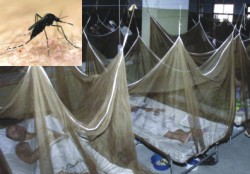Health

Patients with dengue fever in city hospitals are on the rise as this mosquito-borne disease takes a turn for the following monsoon rains. Doctors at different hospitals and clinics in Dhaka say that on average 10 to 15 patients are coming to hospitals with dengue fever every.
Dengue fever is a disease ranging from a mild to severe caused by four related viruses spread by a particular species of mosquito. Mild dengue fever causes high fever, rash, and muscle and joint pain. More severe forms of the disease dengue hemorrhagic fever and dengue shock syndrome can additionally cause severe bleeding, a sudden drop in blood pressure (shock) and death.
No specific treatment for dengue fever exists, and most people recover. But if you have a severe form of the disease, you need hospital care. Fifty million to 100 million cases of dengue infection occur worldwide each year. Most cases of dengue fever occur in urban areas of tropical and subtropical regions.
Signs and symptoms of dengue fever usually begin four to seven days after you've been bitten by a mosquito carrying a dengue virus. These signs and symptoms can vary, depending on the form of the disease. More severe forms of the disease usually begin the same way as the mild form (dengue fever), then become worse after several days.
 Dengue fever signs and symptoms typically include: Dengue fever signs and symptoms typically include:
* High fever, up to 105 F
* A rash over most of your body, which may subside after a couple of days and then reappear
* Severe headache, backache or both
* Pain behind your eyes
* Severe joint and muscle pain
* Nausea and vomiting
Dengue fever rarely causes death, and symptoms usually get better after five to seven days.
Dengue hemorrhagic fever a more severe form of the disease can also cause:
* Significant damage to your blood and lymph vessels
* A decrease in the number blood cells that help your blood clot (platelets)
* Bleeding from the nose, mouth and under the skin, creating the appearance of bruising
* Death
Dengue shock syndrome the most severe form of the disease may also cause:
* Blood vessel fluid (plasma) leakage
* Heavy bleeding
* A sudden drop in blood pressure (shock)
* Death
These signs and symptoms usually appear between the third and seventh day of illness, after fever has improved. They may be preceded by severe abdominal pain, frequent vomiting and disorientation. Two percent to 5 percent of those with a severe form of the disease die. Modern supportive hospital care decreases this risk.
Recovery from dengue fever may include a long period of listlessness, fatigue and even depression.
Dengue fever is caused by any one of four dengue viruses spread by the Aedes aegypti mosquito. These mosquitoes thrive in and near human habitations where they breed in even the cleanest water.
Mosquitoes transmit the virus back and forth between humans. When a mosquito bites a person infected with a dengue virus, the virus enters the mosquito's bloodstream. It then circulates before settling in the salivary glands. When the infected mosquito then bites another person, the virus enters that person's bloodstream, where it may cause the serious illness.
If you've had dengue fever before, you can get it again if you become infected with another one of the four dengue viruses. Having antibodies to a virus in your blood from a previous infection usually helps protect you. But in the case of dengue fever, it actually increases your risk of severe disease dengue hemorrhagic fever if you're infected again. So previous infection with a dengue fever virus increases your risk of a more severe form of the disease. This most often occurs in children.
Most people with dengue fever recover within five to 14 days. Some, particularly adults, may feel listless, tired and even depressed for several weeks to months after being infected.
If severe, dengue fever can lead to dengue hemorrhagic fever and dengue shock syndrome, which can cause heavy bleeding, shock and in about 2 percent to 5 percent of those with these conditions death. Those who survive may experience liver, blood vessel and brain damage, as well as seizures.
No specific treatment for dengue fever exists.
If you have a mild form of the disease, your doctor will recommend making sure to drink enough fluids to avoid dehydration from vomiting and high fever. You can also take acetaminophen (Tylenol, others) for pain and fever. Avoid aspirin or other nonsteroidal anti-inflammatory drugs, such as ibuprofen (Advil, Motrin, others) and naproxen sodium (Aleve). These can increase the risk of bleeding complications.
If you have a more severe form of the disease, treatment consists of supportive care in a hospital. Such care includes intravenous fluids and electrolyte replacement, maintaining adequate blood pressure and replacing blood loss.
If you have any form of dengue fever, you must also be kept away from mosquitoes, to avoid transmitting the disease to others.
Adapted from: HealthNet and Mayo Clinic
Web developed by: Kazi Ziaur Rahman
Copyright
(R) thedailystar.net 2009 |
